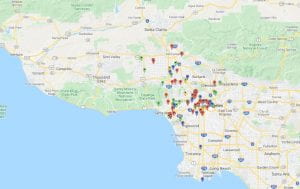CF 20-0303 AT CITY COUNCIL 04/07/2020
PUBLIC COMMENT
In conformity with the Governor’s Executive Order N-29-20 (March 17, 2020) and due to concerns over COVID-19, the City Council meeting will be conducted entirely telephonically.
CITY COUNCIL MEETINGS ARE BROADCAST LIVE ON CABLE TELEVISION CHANNEL 35 AND ON THE INTERNET AT: HTTPS://WWW.LACITY.ORG/GOVERNMENT/FOLLOW-MEETINGS/CITY-COUNCIL-MEETINGS. LIVE COUNCIL MEETINGS CAN ALSO BE HEARD AT: (213) 621-CITY (METRO), (818) 904-9450 (VALLEY), (310) 471-CITY (WESTSIDE) AND (310) 547-CITY (SAN PEDRO AREA)
Members of the public who wish to offer public comment to the Council should call (669) 900-6833 and use Meeting ID No.459 499 150 and then press #. Press # again when prompted for participant ID.
Requests for reasonable modification or accommodation from individuals with disabilities, consistent with the Americans with Disabilities Act can be made by contacting the City Clerk’s Office at (213) 978-1133. For Telecommunication Relay Services for the hearing impaired, please see the information located on page 2 of this agenda
COMMUNICATION FROM THE CITY ADMINISTRATIVE OFFICER (CAO) relative to a proposed contract with BAE Urban Economics, Inc. for the purpose of conducting a fee study analysis of the Systematic Code Enforcement Program (SCEP).
Recommendations for Council action, SUBJECT TO THE APPROVAL OF THE MAYOR:
AUTHORIZE the General Manager, Los Angeles Housing and Community Investment Department (HCIDLA), or designee, to:
Negotiate and execute a contract with BAE Urban Economics, Inc. for the purpose of conducting a fee study analysis for the Systematic Code Enforcement Fee Trust Fund, with a compensation amount not to exceed $120,000, and contract term of three years from February 1, 2020 through January 23, 2023, in substantial conformance with the draft contract attached to this report, subject to review and approval of the City Attorney as to form, funding availability, and compliance with the City’s contracting requirements.
Prepare Controller instructions and make any necessary technical adjustments consistent with Council and the Mayor actions on this matter, subject to the approval of the CAO.
AUTHORIZE the Controller to:
Establish a new account 43S798 – Code Enforcement SCEP Fee Study within the Systematic Code Enforcement Fee Trust Fund No. 41M/43.
Transfer appropriations in the amount of $80,000 in Fund No. 41M/43 from Account No. 43P143, HCIDLA to the new Account No. 43S798, Code Enforcement SCEP Fee Study.
Fiscal Impact Statement: The CAO reports that there is no impact to the General Fund. The proposed contract with BAE Urban Economics will be provided by the Systematic Code Enforcement Trust Fund No. 41M. The requested appropriation will provide funding for the first year of the contract. The remaining balance of funding for the second and third year of the contract term may be subject to approval as part of the 2020-21 Financial Status Reports. The recommendations in the report comply with the City’s Financial Policies in that the City’s financial obligation is limited to funds budgeted for this purpose according to the City’s Standard Provisions.
Community Impact Statement: None submitted.
Click on the BLUE HIGHLIGHT to view official documents and reports.
- 04/03/2020 City Clerk scheduled item for Council on April 7, 2020. Report from City Administrative Officer (February 29, 2020)
- 03/19/2020 Housing Committee waived consideration of item . Report from City Administrative Officer (February 29, 2020)
- 03/10/2020 Mayor document(s) referred to Housing Committee. Report from City Administrative Officer (February 29, 2020)
- 03/06/2020 Document(s) submitted by Mayor, as follows: Report from City Administrative Officer (February 29, 2020)
City Administrative Officer report 0220-00540-142, dated February 19, 2020, relative to the proposed contract with BAE Urban Economics, Incorporation for the purpose of conducting a fee study analysis of the Systematic Code Enforcement Program.

